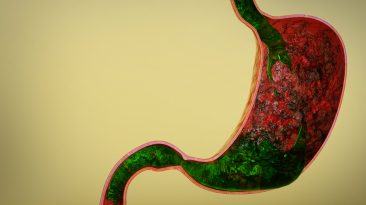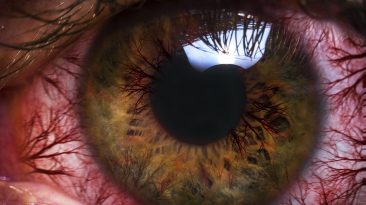Just think of the simple act of crossing the street: how would you know it’s safe if you couldn’t see the cars, hear their horns, or feel the road in front of you? You wouldn’t.
But what if you lost just one sense at a time? How would the remaining ones respond? Would you be able to survive?
As each sense left your body, the remaining ones would start working to compensate for the loss. If you lost your sight, your brain would re-wire itself to understand your surroundings using auditory techniques like echolocation.
But once all your senses were gone, you’d just be a mind trapped inside of a body. Would life even be worth living?
Imagine you woke up one day without your sense of taste, how long would it take you to realize it was gone? It’d probably be the moment you took your first bite of breakfast, and noticed that it was comparable to chewing a piece of gum that’s lost its flavor.
Most of us have experienced temporary taste loss before thanks to the common cold or the flu, but severe nervous system conditions can make it a permanent problem. Luckily, about 80% of our taste sensation is actually provided by our sense of smell, so maybe it’s not that big of a loss.
But what if the smell of those cinnamon buns starts to go faint, and before you know it, a second sense is gone too? The complete loss of the sense of smell is known as Anosmia (an-OHZ-me-uh), and it can be caused by anything from cocaine use to Alzheimer’s or Parkinson’s disease.
Not only would you lose all ability to appreciate the flavors of your food, but you wouldn’t be able to smell a gas leak, smoke from a fire, or spoiled milk. Now, things are starting to get dangerous, you’d probably be best to get to a doctor.
But as you drive to the hospital, you start to realize that you can’t tell how hard you’re pressing the pedals or gripping the steering wheel: your sense of touch is disappearing too. In general, our sense of touch decreases as we get older, but it’s also possible to lose it all together through nerve damage from injuries or from medical conditions.
This would be your most significant loss so far: you’d no longer be able to feel the touch of a loved one, and you wouldn’t be able to feel if you were harming your body. Even walking would be difficult, since you wouldn’t be able to feel your feet touching the ground.
So you stumble on to the hospital and see an ambulance zoom by with its lights flashing, but you suddenly can’t hear the sirens. When most people lose their hearing, they can at least turn to vibrations to process auditory information, but without a sense of touch, that’s not going to be an option.
Hearing loss can be caused by anything from exposure to loud noise, to trauma, diseases, or just genetics. Making it to the hospital would be even harder now because you couldn’t even hear the impacts of your steps to coordinate your movements. And if you did make it to the emergency room, communicating your issues would be very difficult.
As you try to read the confused doctors’ lips, you notice that things are getting blurry, and dark. There’s only one thing left to lose. Lots of people navigate life without vision, 285 million people in the world are visually impaired. But they usually use their other senses to get by, and, unfortunately for you, those are all gone.
So with no senses left at all, your mind would be stuck in a sort of dark limbo. With no idea of the outside world, a deadly trauma could happen quickly, without you even registering the danger.
The only way to survive now would be under someone else’s care, and even that wouldn’t be great. Complete sensory deprivation causes the brain to hallucinate, so you’d virtually be stuck in a dream, and that would have devastating effects on your psychological health.
Luckily, people rarely lose all their senses. Maybe one day we’ll even be able to restore all the ones that get lost, but that’s a topic for another WHAT IF.
Sources
- DYE, OPINION. 2018. “How The Blind ‘See’ With Other Senses”. ABC News. Accessed November 12 2018.
- Staughton, John, 2015. “Does Losing One Sense Improve The Others? » Science ABC”. scienceABC. Accessed November 12 2018.
- “Surprising Facts About Losing Your 5 Senses | Healthcentral”. 2018. healthcentral.com. Accessed November 12 2018.
- “Taste Is Mostly Smell”. 2018. curiosity.com. Accessed November 12 2018.
- “Impaired Taste: Diagnosis, Causes, And Treatments”. 2018. healthline. Accessed November 12 2018
- Corey Binns. 2006. “How We Smell”. livescience. Accessed November 12 2018
- “Anosmia: Symptoms, Causes, And Treatments”. Webmd. Accessed November 12 2018
- “What It’s Like To Live Without Your Sense Of Touch”. Sushma Subramanian, 2015. Women’s Health. Accessed November 12 2018
- “Sensory Loss Series – Touch | Lexology”. 2018. lexology.com. Accessed November 12 2018.
- “The Causes And Symptoms Of Severe Hearing Loss”. Webmd. Accessed November 12 2018
- “Being Deaf: How Different the World is Without Hearing” David Peter, 2018. gizmodo.com. Accessed November 12 2018.
- “What would happen to a human who lost all his senses (sight, hearing, taste, smell, touch, balance, acceleration, temperature, kinetic, and pain)?” Quora.com



























